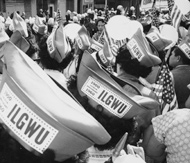

Archive Transcript: Speeches
Benajmin Schlesinger Statement at the Albany Conference before Governor Roosevelt, 1930
Statement by President Benjamin Schlesinger
At the Albany Conference before
Governor Roosevelt
Friday, February 7th, 1930
The manufacture of dresses, which is one of New York's leading industries with an annual turnover of more than $350,000,000, has lapsed into a condition of utter chaos, ruinous alike to workers and employers.
Out of the 2500 employers no more than 500 are manufacturers, working independently and directly for the trade, and even among these there are many who manufacture only a small part of their work on their own premises. Most that they sell is made up in sweatshops.
The great bulk of employers in the dress industry are contractors, working for "jobbers" or "manufacturer-jobbers". There are approximately two thousand contractors' shops in the city bidding for the patronage of the jobbers and the manufacturer-jobbers. Few of these contractors' shops are fair-sized. The greater part are fly-by-night enterprises, conducted under disgraceful labor condition. The dread sweatshop of unsavory memory is reappearing among us and threatening to swamp the whole industry. All reasonable industrial standards are swept away and the fair-minded manufacturer, jobber and contractor find it ever more difficult to stand up against their unscrupulous rivals.
The responsibility for this unwholesome condition rests upon the employers as the managers of the industry, but the brunt of the resulting suffering and misery falls upon the workers.
The dress industry of New York employs about 35,000 workers. Sixty percent of these are women who, standing alone, are defenseless against the most unscrupulous exploitation in the hands of sweatshop keepers.
Most of the provisions which were inserted in our agreements of 1919, 1923, 1925, and 1927 for safeguarding the rights and interests of workers had become a dead letter long before they expired. Our agreements call for fixed and reasonable scales of pay, but the vast majority of the workers were forced to work for arbitrary pay and many thousands of them earned as little as $12.00 a week.
Our contracts also called for a work-week of five days, but a six-day week was the rule, rather than the exception, and the hours of work were often unregulated and practically unlimited.
The evil of home work and the disgraceful "padrone system" again crept into the industry. Under the latter system a worker in the shop is permitted to sub-contract his work to "helpers", who are thus exposed to the triple exploitation by the padrone, the contractor, and the jobber.
If the industry is to be save from chronic and destructive chaos, and if the workers in it are to be assured livable earnings and working conditions approximating even the most modest standards of American life, all factors in the industry must join hands in an honest and intelligent effort to reorganize it on a basis of reason and decency.
Our Union took the initiative in that direction and has devoted its whole energy and resources to the accomplishment of this vital objective and the total elimination of the disgraceful sweating system. With this purpose in view, we have undertaken an active campaign among the workers to prepare and equip them for any struggle that may become necessary for their self-preservation.
About 30,000 dressmakers have responded to our Union's strike call last Tuesday, February 4th and I am convinced that the other five, six thousand, who have not yet responded, will do so within the next few days as the strike progresses. We are, however, very anxious to avoid a long drawn out and bitter strike. We prefer a peaceful solution of the problems in the shortest time possible. I am, therefore, very thankful to you, Mr. Governor, for calling this conference. I have reason to believe that his conference in Albany will be followed up by a series of conferences in New York between the associations and our Union, at which a just settlement will be reached.
We hope that the employers are as keenly alive to the critical situation in our industry as our Union is and that they will cooperate with us in the task of coping with the sweatshop danger and reconstructing our industry along sane, fair and humane lines.
The sweatshops in the dress industry must go and go forever. Our Union will not rest and our workers will not give up their fight until the sweatshops are eliminated and until fair working standards and decent living conditions are established in the industry.


